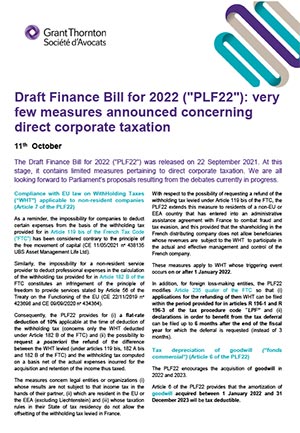-
Pilotage de la politique fiscale
Pilotage de la politique fiscale
-
Gestion de la croissance
Gestion de la croissance
-
Contrôle et contentieux fiscal
Contrôle et contentieux fiscal

-
Définition d’une structuration stratégique et sécurisée des prix de transfert
Accompagnement à la définition d’une structuration stratégique et sécurisée des prix de transfert
-
Accompagnement au développement des activités à l’international et aux réorganisations opérationnelles « Business restructuring »
Accompagnement au développement des activités à l’international et aux réorganisations opérationnelles « Business restructuring »
-
Défense des pratiques dans le cadre des contrôles fiscaux et de leur suite
Assurer la défense des pratiques dans le cadre des contrôles fiscaux et de leur suite
-
Obligations déclaratives accrues et généralisées
Répondre aux obligations déclaratives accrues et généralisées

-
TVA domestique et internationale applicable à vos flux
TVA domestique et internationale applicable à vos flux
-
TVA bancaire et financière, TVA dans le secteur assurance
TVA bancaire et financière, TVA dans le secteur assurance
-
TVA immobilière et droits d’enregistrement (DE)
TVA immobilière et droits d’enregistrement (DE)
-
TVA dans le secteur public et associatif
TVA dans le secteur public et associatif
-
Contrôle fiscal, contentieux fiscal et relations avec l’Administration fiscale
Contrôle fiscal, contentieux fiscal et relations avec l’Administration fiscale
-
Règles applicables en matière de facturation
Règles applicables en matière de facturation
-
Problématiques douanières liées à vos flux internationaux
Problématiques douanières liées à vos flux internationaux
-
Obligations d’immatriculation à la TVA et obligations déclaratives
Obligations d’immatriculation à la TVA et obligations déclaratives (TVA, DEB, DES)
-
Taxe sur les salaires
Taxe sur les salaires
-
Autres taxes indirectes
Autres taxes indirectes

-
Le Diag Transmission
Nous vous aidons à anticiper et appréhender votre opération de transmission

-
Mise en place et structuration de votre stratégie de distribution
Mise en place et structuration de votre stratégie de distribution
-
Digitalisation des activités de distribution
Digitalisation des activités de distribution
-
Relations entre fournisseurs et distributeurs
Gérer vos relations avec vos fournisseurs et distributeurs
-
Mise en place et structuration de votre politique contractuelle
Mise en place et structuration de votre politique contractuelle
-
Contrôle et contentieux en matière de délais de paiement
Contrôle et contentieux en matière de délais de paiement
-
Organisation et sécurisation de vos relations commerciales avec les consommateurs
Organisation et sécurisation de vos relations commerciales avec les consommateurs
-
Droit des données personnelles - RGPD
Droit des données personnelles – conseil en RGPD
-
Baux commerciaux
Un accompagnement dans la gestion et le Contract Management des baux commerciaux.

-
Prestations traditionnelles
Prestations traditionnelles en droit social
-
Santé au travail et qualité de vie au travail
Assurer une plus grande souplesse dans l’organisation du temps de travail et améliorer la qualité de vie au travail
-
Audit du Management des Ressources Humaines
Auditer des prestations de service de la fonction RH au Groupe
-
Ingénierie RH & People Change
Mettre en place des réponses managériales en réponse aux enjeux stratégiques de l’entreprise
-
Gestion de la conformité RH et des enquêtes internes
Gestion de la conformité RH : harcèlement, discrimination et dénonciation…

-
Conseil dans la structuration juridique
Conseil dans la structuration juridique
-
Gestion courante des entreprises
Gestion courante des entreprises
-
Réorganisation d’entreprises
Réorganisation d’entreprises
-
Cession et acquisition d’entreprises
Cession et acquisition d’entreprises
-
Evolution de l’actionnariat – Emission de valeurs mobilières
Evolution de l’actionnariat – Emission de valeurs mobilières
-
Gouvernance et maîtrise des risques juridiques
Gouvernance et maîtrise des risques juridiques

-
Développement d’une politique de mobilité internationale
Développement d’une politique de mobilité internationale
-
Coordination des obligations déclaratives des salariés en situation de mobilité
Coordination des obligations déclaratives des salariés en situation de mobilité
-
Conseil en matière de sécurité sociale
Conseil en matière de sécurité sociale
-
Assistance en matière de droit du travail
Assistance en matière de droit du travail

-
La gestion et l'exploitation de vos portefeuilles de droits
Nous établissons avec nos clients la politique de protection de leurs droits de propriété intellectuelle la plus adaptée à leurs projets.
-
La sécurisation de vos projets : conseil et rédaction contractuelle
Conseil en matière de propriété intellectuelle, de droit de la publicité, politique contractuelle en matière de droit d’auteur et droit à l’image.
-
La défense de vos droits : précontentieux et contentieux
La défense de vos droits : détection des atteintes, précontentieux et contentieux

The Draft Finance Bill for 2022 ("PLF22") was released on 22 September 2021. At this stage, it contains limited measures pertaining to direct corporate taxation. We are all looking forward to Parliament’s proposals resulting from the debates currently in progress.
Compliance with EU law on WithHolding Taxes (“WHT") applicable to non-resident companies (Article 7 of the PLF22)
As a reminder, the impossibility for companies to deduct certain expenses from the basis of the withholding tax provided for in Article 119 bis of the French Tax Code (“FTC”) has been considered contrary to the principle of the free movement of capital (CE 11/05/2021 n° 438135 UBS Asset Management Life Ltd).
Similarly, the impossibility for a non-resident service provider to deduct professional expenses in the calculation of the withholding tax provided for in Article 182 B of the FTC constitutes an infringement of the principle of freedom to provide services stated by Article 56 of the Treaty on the Functioning of the EU (CE 22/11/2019 n° 423698 and CE 09/09/2020 n° 434364).
Consequently, the PLF22 provides for (i) a flat-rate deduction of 10% applicable at the time of deduction of the withholding tax (concerns only the WHT deducted under Article 182 B of the FTC) and (ii) the possibility to request a posteriori the refund of the difference between the WHT levied (under articles 119 bis, 182 A bis and 182 B of the FTC) and the withholding tax computed on a basis net of the actual expenses incurred for the acquisition and retention of the income thus taxed.
The measures concern legal entities or organizations (i) whose results are not subject to that income tax in the hands of their partner, (ii) which are resident in the EU or the EEA (excluding Liechtenstein) and (iii) whose taxation rules in their State of tax residency do not allow the offsetting of the withholding tax levied in France.
With respect to the possibility of requesting a refund of the withholding tax levied under Article 119 bis of the FTC, the PLF22 extends this measure to residents of a non-EU or EEA country that has entered into an administrative assistance agreement with France to combat fraud and tax evasion, and this provided that the shareholding in the French distributing company does not allow beneficiaries whose revenues are subject to the WHT to participate in the actual and effective management and control of the French company.
These measures apply to WHT whose triggering event occurs on or after 1 January 2022.
In addition, for foreign loss-making entities, the PLF22 modifies Article 235 quater of the FTC so that (i) applications for the refunding of then WHT can be filed within the period provided for in articles R 196-1 and R 196-3 of the tax procedure code “LPF” and (ii) declarations in order to benefit from the tax deferral can be filed up to 6 months after the end of the fiscal year for which the deferral is requested (instead of 3 months).
Tax depreciation of goodwill (“fonds commercial”) (Article 6 of the PLF22)
The PLF22 encourages the acquisition of goodwill in 2022 and 2023.
Article 6 of the PLF22 provides that the amortization of goodwill acquired between 1 January 2022 and 31 December 2023 will be tax deductible.
Repeal of inefficient tax expenditures (Article 10 of PLF22)
The PLF22 provides for the removal of tax exemptions for companies which were created to take over a company or an industrial establishment in difficulty, and more notably:
- the exemption from corporate income tax on profits made during the 24 months following their creation,
- the temporary exemption from property tax on developed properties, and from the CFE and CVAE for companies benefiting from the exemption from corporate income tax.
Finally, the PLF22 provides for the repeal of the exemption from income tax capped at €61k of profits, for those companies operating in urban free zones (ZFU) and which until now had benefitted from said exemption.
Adjustment of capital gains tax exemption on transfer of businesses (Article 5 of the PLF22)
The PLF22 provides for the widening of the scope of exemptions for capital gains realized on the sale or transfer of companies (Article 238 quinquies of the FTC).
In the aim of encouraging business takeovers, the PLF22 proposes:
- to increase the ceilings for the exemption of capital gains on the disposal of businesses: a total exemption would apply when the sale price is less than or equal to €500,000 (instead of €300k), and a partial exemption in the case where the sale price is less than or equal to €1m (instead of €500k);
- to extend this provision to the transfer of a business under a management lease to anyone other than the standing lease manager if the latter does not take over the business and provided that the transfer is backed by a transfer of all the elements which contribute to the operation of the business that was the subject of the management lease.
Several provisions also aim to ease the exemption mechanisms for capital gains on securities or businesses when the managers of individual businesses come to retire.
















